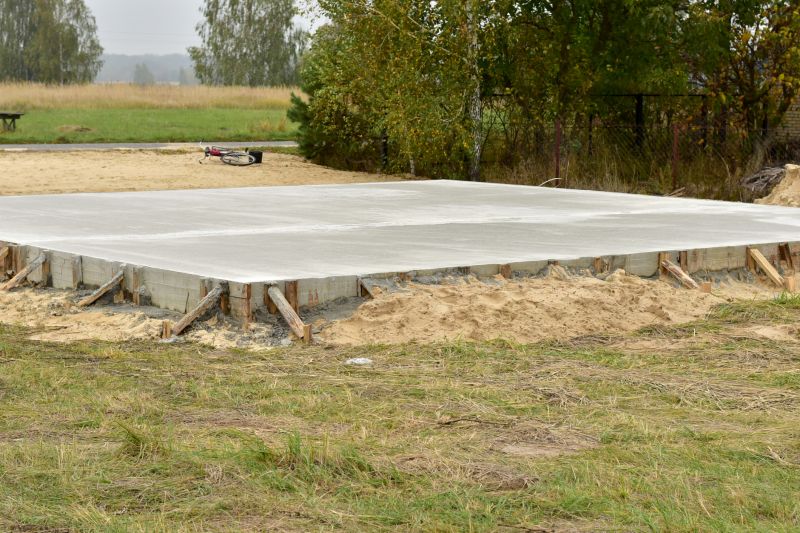Ultimate Guide To Products For Concrete Installations
Explore essential equipment and materials that support professional-quality concrete projects from start to finish.
 Concrete installation projects in Seattle, WA, require a variety of specialized products to ensure durability, safety, and quality results. From foundational work to decorative finishes, selecting the right materials and tools can significantly influence the outcome of your project. Whether you are working on a small residential driveway or a large commercial slab, understanding the range of available products helps in making informed decisions. Proper preparation, mixing, pouring, and finishing are all critical steps that benefit from the appropriate equipment and supplies.
Concrete installation projects in Seattle, WA, require a variety of specialized products to ensure durability, safety, and quality results. From foundational work to decorative finishes, selecting the right materials and tools can significantly influence the outcome of your project. Whether you are working on a small residential driveway or a large commercial slab, understanding the range of available products helps in making informed decisions. Proper preparation, mixing, pouring, and finishing are all critical steps that benefit from the appropriate equipment and supplies.
Top Overall Option
Heavy-Duty Concrete Mixing and Pouring Kit
A versatile and comprehensive set designed for mixing, pouring, and finishing concrete. It includes durable mixing tools, leveling screeds, and finishing trowels, suitable for a range of project sizes. This kit supports consistent mixing and smooth application, helping users achieve professional-looking results. Its sturdy construction ensures longevity and ease of use for both DIYers and professionals.
Types of Products For Concrete Installations
Concrete Mix
Pre-blended or custom-mixed concrete for various applications, available in different strength grades.
Rebar and Reinforcement Mesh
Steel reinforcement materials to strengthen concrete slabs and structures, reducing cracking and improving durability.
Concrete Sealers
Protective coatings that enhance surface resistance to stains, moisture, and wear.
Bonding Agents
Adhesives used to promote strong bonds between new and existing concrete surfaces.
Curing Compounds
Products that retain moisture in the concrete to ensure proper curing and strength development.
Form Release Agents
Materials applied to molds or forms to facilitate easy removal and prevent sticking.
Concrete Vibrators
Tools used to eliminate air pockets and ensure proper compaction of poured concrete.
Trowels and Floats
Hand tools for finishing and smoothing concrete surfaces to achieve the desired texture.
Screeds
Tools for leveling freshly poured concrete to ensure an even surface.
Expansion Joints
Preformed joints that allow for movement and expansion in concrete slabs, preventing cracking.
Concrete Edgers
Tools to create clean, rounded edges on concrete slabs for a finished look.
Concrete Cutters and Saws
Equipment for cutting concrete to size or creating control joints.
Waterproofing Membranes
Materials applied to concrete surfaces to prevent water ingress and damage.
Concrete Anchors
Fasteners used to secure fixtures or structural elements to concrete surfaces.
Surface Retarders
Chemical agents that delay surface setting for decorative or textured finishes.
Popular Choices
Mobility-focused mixers suitable for small to medium projects, facilitating on-site mixing.
Ready-to-use patches for minor repairs and surface restoration.
Devices that help create clean, defined edges for decorative or functional purposes.
Replacement parts or attachments for vibrators to enhance compaction.
Additives that improve concrete performance for demanding applications.
Reusable molds and forms for shaping concrete structures efficiently.
Specialized tools for creating textured or smooth finishes on concrete surfaces.
Materials used to maintain moisture during curing, especially in dry conditions.
Protective covers that accommodate movement in concrete slabs.
Solutions and tools for removing stains and debris from finished surfaces.
Fasteners used to secure reinforcement in place during pouring.
Materials for correcting uneven surfaces or filling low spots.
Tools for imprinting patterns and textures onto fresh concrete for decorative effects.
In concrete installation, the importance of quality cannot be overstated. Products such as high-grade sealers, bonding agents, and curing compounds contribute to the longevity of the finished surface. For structural components, reinforcement materials like rebar and wire mesh are essential to improve strength and reduce cracking. Tools like trowels, floats, and screeds facilitate smooth finishes, while safety gear ensures protection during the process. By carefully selecting each product, contractors and DIY enthusiasts alike can achieve results that meet safety standards and aesthetic expectations.
Given the variety of products available, it is helpful to consider the specific requirements of your project, including the scale, location, and desired finish. Investing in reliable, durable supplies tailored to concrete work can save time and reduce the need for costly repairs or rework. Local suppliers in Seattle, WA, often stock a comprehensive range of these products, enabling quick access and support. Staying informed about the latest advancements and best practices ensures your concrete installation projects are successful and long-lasting.
Key Buying Considerations
- Project scale and scope to determine the quantity and type of products needed.
- Compatibility of products with existing surfaces or materials.
- Durability and weather resistance, especially for outdoor installations in Seattle's climate.
- Ease of use and safety features of tools and equipment.
- Material quality and manufacturer reputation to ensure reliable performance.
- Specific application requirements such as load-bearing capacity or decorative finish.
- Compatibility with local building codes and standards.
- Availability of replacement parts or accessories for ongoing maintenance.
- Budget constraints balanced with quality to achieve long-term value.
- Environmental conditions during application, including temperature and humidity.
- Storage and handling requirements for certain chemicals or equipment.
- Ease of cleaning and maintenance of tools post-use.
- Support and customer service from suppliers or manufacturers.
- Availability of instructional resources or training for complex products.
- Compatibility with other construction materials being used.
